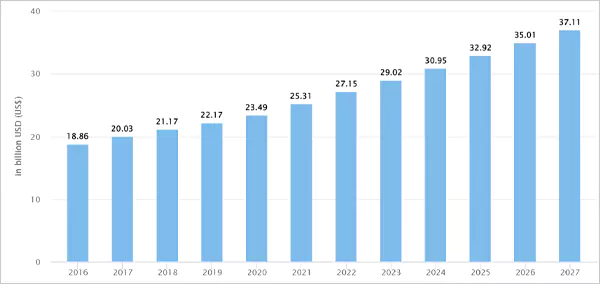According to Statista, sales of vitamins and supplements are expected to reach US$ 32.92 billion in 2025, indicating a growing market as more consumers look to make healthier choices.

More and more people searching for the top health supplement may leave you wondering how you can sell supplements to become part of this active and evolving market. Whether you are a professional in the health industry, an online entrepreneur, or just a curious consumer, this guide is designed to provide you with the knowledge and resources you need to get started.
From understanding supplement regulations to finding a reliable manufacturer, we’ve got you covered. Keep reading to learn more about selling supplements.
Important Factors to Consider Before Starting
Here are some of the important factors to consider before you start your supplement business.
- Understand the Regulations: It’s essential to have a solid understanding of the rules regarding dietary supplements, which are managed by organizations like the FDA (US Food and Drug Administration).
- Market Investigation and Niche Identification: Instead of just hopping on trends, allocate resources to thorough market research aimed at identifying a niche with untapped demands. Examine consumer health considerations, demographics, and the current supplement market.
- Product USP: What sets your supplements apart? Emphasize unique formulations, the use of organic ingredients, or practices centered around sustainable sourcing. Highlighting these aspects will distinguish your products in the market.
Choose the Right Product Supplier
Choosing the right supplier is one of the most significant decisions. Finding good sources of ingredients like Private label magnesium citrate, multi-vitamins, and pre-workout supplement ingredients is a critical task.
While choosing a supplier, collaborate with a manufacturer adhering to GMP standards, emphasizing rigorous quality checks and furnishing Certificates of Analysis (COAs) for ingredient validation.
Try to seek out suppliers committed to ethically acquiring non-GMO ingredients, appealing to health-conscious clientele. Additionally, look for a supplier who can provide a range of product formats such as capsules, tablets, and gummies to accommodate diverse consumer preferences.
Create a Business Plan for Selling Supplements
Creating a business plan for selling supplements can be an intimidating process, but it is essential to the success of any supplement business.
The first step is to define your target market and develop a marketing strategy that will reach them. This should include research into the needs of the target market, such as their health goals and lifestyle habits, so you can create products that meet those needs.
Once you have developed an understanding of who your customers are and what they require, you can begin developing strategies for pricing, distribution channels, packaging design, and other aspects of marketing.
Finally, create financial projections based on sales forecasts for various scenarios such as seasonal trends or expansion plans so that you are prepared. A comprehensive business plan will help ensure success by guiding every stage of setting up and running your company while helping minimize risk along the way.
Find the Right Payment Processing System
The ideal payment processor should not only offer secure checkout systems that protect both customers’ data and your business information but also provide a seamless customer experience.
In the digital age, Blockchain has powered online payments and changed the landscape for businesses. It is important to research various options for card processors as well as shipping providers to find the best fit for your business needs.
Payment processing solutions should include features such as fraud prevention tools, multiple currency support, and easy integration with e-commerce platforms.
Additionally, you will want a solution that offers competitive transaction fees and other pricing plans so you can save money on each sale without sacrificing service quality. Many payment processors offer additional services like merchant account management, invoicing capabilities, and even advanced analytics, so be sure to look into these options when making your decision.
It goes without saying that businesses these days are open to dealing with cryptocurrency. In some cases, you can save money by making crypto payments, so stay ready to whip out your crypto wallet if you want to make smarter payments.
Conclusion
Overall, this guide is an invaluable resource for any business looking to capitalize on the growing market for health and wellness products.
It provides key insights into the regulations, marketing strategies, and potential customer base for dietary supplement products, as well as provides readers with the knowledge and tools necessary to successfully market and sell these products.
Best wishes on your journey to becoming a trusted supplier of premium supplements in the online market.
Frequently Asked Questions (FAQs)
Ans: Although these margins often differ from business to business, the majority of supplement manufacturers can make a profit margin on their goods of 10% to 20%.
Ans: The FDA is in charge of regulating dietary ingredients as well as finished supplement products. It has different regulations for dietary supplements than it does for “conventional” foods and pharmaceuticals.
Ans: The most widely recognized standards for supplements are established by USP, a nonprofit.







